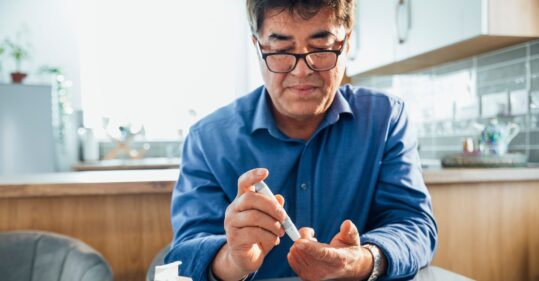Mild Covid-19 linked to increased risk of type 2 diabetes

Adults who recover from mild Covid-19 appear to be at higher risk of developing type 2 diabetes, according to a study undertaken in Germany.
The researchers found that the risk of developing type 2 diabetes in people who had been infected with mild Covid-19 was 28% higher than in people infected with a non-Covid-19 related upper respiratory airways infection.
The findings were published in Diabetologia, and if confirmed, the researchers recommend diabetes screening in all individuals recovering from mild forms of Covid-19.
Related Article: Be alert to pancreatitis in patients using GLP-1 weight-loss drugs
Previous studies have found that inflammation often associated with a Covid-19 infection may kill or damage insulin-producing beta cells, resulting in high blood glucose levels.
In addition, it has been suggested tissues may become less reactive to insulin post-Covid-19 infection and sedentary lockdown lifestyles both may increase the risk of developing type 2 diabetes.
Lead author of the study, Professor Wolfgang Rathmann from Heinrich Heine University in Germany, explained: ‘Covid-19 infection may lead to diabetes by upregulation of the immune system after remission, which may induce pancreatic beta-cell dysfunction and insulin resistance. Or patients may have been at risk for developing diabetes due to having obesity or prediabetes, and the stress COVID-19 put on their bodies speeded it up.’
The researchers examined health records from1 171 general practices across Germany between March 2020 and January 2021, including information from 8.8 million adults from the Disease Analyzer database. Nearly thirty-six thousand patients had been diagnosed with Covid-19 and were compared with a cohort of individuals diagnosed with an acute non-Covid upper respiratory tract infection within the same timeframe.
New cases of type 2 diabetes were more common in patients who tested positive for Covid-19 than those who had a non-Covid upper respiratory tract infection, with 15.8 per 1000 people per year in the Covid-19 group versus 12.3 per 1000 people per year in the non-Covid-19 group.
Related Article: Low-energy diet improved eating disorder symptoms in patients with type 2 diabetes
‘The risk of abnormally high blood sugar in individuals with Covid-19 is most likely a continuum, depending on risk factors such as injury to beta cells, an exaggerated inflammatory response, and changes in pandemic-related weight gain and decreased physical activity,’ said co-author Professor Oliver Kuss also at Heinrich Heine University.
It is unclear whether these metabolic changes are temporary or whether individuals with Covid-19 may be at increased risk of developing chronic diabetes. Prof Rathmann added: ‘Since the Covid-19 patients were only followed for about three months, further follow-up is needed to understand whether type 2 diabetes after mild Covid-19 is just temporary and can be reversed after they have fully recovered, or whether it leads to a chronic condition.’
Although type 2 diabetes is not likely to be a problem for the vast majority of people who have mild Covid-19, the researchers recommend that anyone who has recovered from Covid-19 be aware of the warning signs and symptoms of diabetes such as increased thirst and frequent urination and seek professional advice.
Related Article: Wales diabetes prevention programme cuts risk of developing type 2 diabetes by nearly a quarter
The link between Covid-19 and diabetes is also being investigated in various ongoing studies, such as the CoviDiab registry and other studies connected to long Covid.

See how our symptom tool can help you make better sense of patient presentations
Click here to search a symptom




